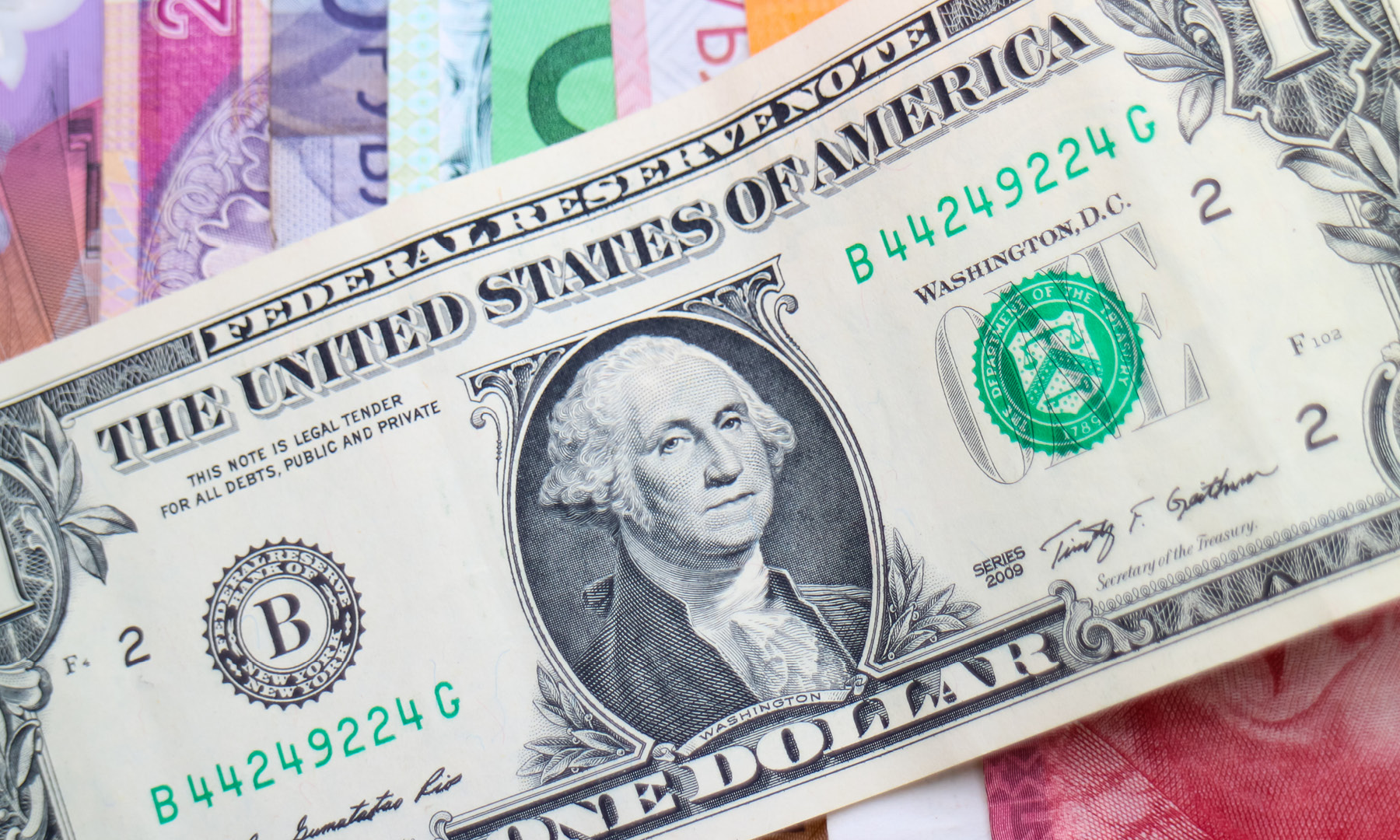5 min read
The U.S. Dollar and Its Role in the Global Economy
 Kelly Jernigan
:
Aug 28, 2023 4:34:00 PM
Kelly Jernigan
:
Aug 28, 2023 4:34:00 PM

Kelly Jernigan, CFA®, Portfolio Manager Team Leader, discusses whether the dollar is losing its dominance on the world stage, and how it could impact investors
How did the dollar become the world’s reserve currency?
For more than a century, the U.S. dollar (USD) has played a dominant role in the global economy. Through two world wars, the Great Depression, the Cold War and the evolution of the U.S. from a goods producing economy to a service-oriented one, the influence of the USD has grown to become the world’s reserve currency. Two transformational events fueled this ascendancy.
The first event occurred during World War II. In 1944, delegates from 44 nations gathered to set up a new international monetary system. This new system, named Bretton Woods system, drew from lessons learned during prior gold standards and the experience of the Great Depression. The Bretton Woods system established the USD — backed by gold — as the universal standard for currency exchange. Countries agreed to keep their currencies tied to the USD and the USD was fixed to gold at $35 an ounce. Bretton Woods was an unprecedented cooperative effort to provide currency stability and promote global economic growth. By 1971, there were more dollars held overseas than the value of U.S. gold reserves. As a result, Richard Nixon stopped the USD convertibility into gold effectively ending the Bretton Woods system. Still the USD remained the reserve currency.1
The other event was the post-WW II growth of the U.S. economy. After 1945, the U.S. was the world’s largest economy, representing about half of the global Gross Domestic Product (GDP) output. By 1960, Western European and Japan’s economic recovery had trimmed U.S. economic output to about 40% of global GDP. Fast forward to 2020 and the U.S. comprised about 25% of world GDP (see chart.)
Much of the reduction for the past 60 years is because other economies have grown faster than the U.S. economy. Although our share of the global economy is lower than before, it is still very significant. Many countries continue to use the dollar because the dollar is backed by the U.S. government, making the dollar stable and safe.
Why are dollars held overseas?
The USD as a reserve currency is held by foreign central banks and major financial institutions to use in international transactions, to pay for international debt or to support their domestic exchange rate. There are several factors that determine if a currency will be used for reserves. These include the size of the domestic economy, the importance of the economy in international trade and the size, depth and openness of its financial markets.2 When countries trade with one another and investors buy foreign securities, they take on currency risk, or that the value of goods and services traded will change with the value of the currencies involved in the trade.
Holding a reserve currency can help protect a country’s financial system from the currency risk volatility and inflation of its own currency. According to the following chart on foreign currency reserves, the USD comprised 58.4% of allocated currency reserves followed by the euro at 20.5%, the Japanese yen at 5.6%, the British pound at 5.0%, and China’s renminbi at 2.7% at the end of 2022.
How does the U.S. benefit from the role of the dollar as the global currency?
One of the benefits from having the dollar as the global reserve currency is the U.S. does not have as much exchange rate risk as other countries. The USD’s role allows the U.S. to get a higher return on our foreign assets and a lower payment on our foreign debt. Basically, we get to borrow at a cheaper rate, and it costs us less to spend overseas. We import more than we export and consume more than we produce, which increases our standard of living.
What are the challenges to the dollar?
The dollar is still the world’s reserve currency because of the safety, security, and depth of the U.S. markets. The dominance of the dollar is based on the belief the U.S. will pay its obligations. If the U.S. were to default on its Treasury bonds, the perception of the USD’s safety and security would be damaged. This would have a substantial impact by causing other countries to move away from the dollar. A smaller impact on dollar dominance is use of economic sanctions by the U.S. as a diplomatic tool. When a country, such as Russia, has come under sanctions it may move away from the dollar as a reserve currency. Another factor is as other economies grow faster, the dollar will not be as dominate in global trade. These two factors may slowly erode the dollar’s dominance, but it does not mean another currency will replace the dollar as the world’s reserve currency.
Is the dominant role of the dollar in the global economy ending? The USD remains the world’s reserve currency, providing relative stability and safety compared to other currencies. The dollar also supports global trade through its role in banking and its ease of use. The large supply of U.S. Treasuries also helps to preserve the USD’s dominant role.
Currently, there is no alternative to the dollar as the reserve currency. Two candidates, the euro and China’s renminbi, sometimes referred to as the yuan, face substantial challenges.
The euro doesn’t have the safety and depth of the USD. The euro zone has not completed its central banking union and needs a deeper and more liquid capital market to make the euro more attractive as a global currency.3 During the Great Recession in 2009, the euro almost ceased to function as a currency. The euro faces additional pressures, which include lingering trade and economic issues from the United Kingdom’s 2019 exit from the European Union, as well as the Russia and Ukraine conflict.4
The Chinese renminbi has several headwinds to becoming a reserve currency. While 70 central banks hold the renminbi in reserve, it is the fifth-ranked currency based on total global holdings. During the first half of 2022, only 2% of global import and export contracts were denominated or settled in renminbi. By comparison, the USD accounts for about 75% of world trade contracts and settlements. Lastly, China's communist government would have to relax its need for control to allow open and flexible financial markets to support a global reserve currency.5
Will Central Bank Digital Currencies replace the dollar?
It is very early days for Central Bank Digital Currency (CBDC), which are both issued by a central bank and are a liability of the central bank. Basically, the Fed would issue digital currency and you would keep it at the Fed, not at a bank like Commerce. China has launched a pilot program, but its program, e-CNY, has had slow uptake. The reason is that Alipay and WeChat Pay already work well, so many retailers cannot be bothered with e-CNY.6 In countries with advanced payment and banking systems, it appears digital currencies are not needed and any advantage in transactions and settlements can happen in the existing systems.
1 Sandra Kollen Ghizoni, “Creation of the Bretton Woods System,” federalreservehistory.org, Nov. 22, 2013
2 https://home.treasury.gov/system/files/206/Appendix1FinalOctober152009.pdf
3 European Central Bank, The International Role of the Euro, pages 14-15, June 2021
4 Alasdair Sandford, “Post-Brexit Guide: What’s been the impact – and how did it happen?”, Euronews, March 10, 2023
5 Milton Ezrati, “Yuan Pipe Dreams,” Forbes, Jan. 26, 2023
6 The Economist, “Central-bank digital currencies are talked about more than coming to fruition.” May 15, 2023
The Chartered Financial Analyst® (CFA®) Charter is a designation granted by CFA Institute to individuals who have satisfied certain requirements, including completion of the CFA Program and required years of acceptable work experience. Registered marks are the property of CFA Institute.
Past performance is no guarantee of future results, and the opinions and other information in the commentary are as of Aug. 28, 2023. This summary is intended to provide general information only and is reflective of the opinions of Commerce Trust. This material is not a recommendation of any particular security, is not based on any particular financial situation or need and is not intended to replace the advice of a qualified attorney, tax advisor or investment professional.
Diversification does not guarantee a profit or protect against all risk. Commerce Trust does not provide tax advice or legal advice to customers. Consult a tax specialist regarding tax implications related to any product and specific financial situation. Data contained herein from third-party providers is obtained from what are considered reliable sources. However, its accuracy, completeness or reliability cannot be guaranteed.
INVESTMENT PRODUCTS: NOT FDIC INSURED | MAY LOSE VALUE | NO BANK GUARANTEE COMMERCE TRUST IS A DIVISION OF COMMERCE BANK.
Interested in more insights?
Subscribe Now
Related Articles
